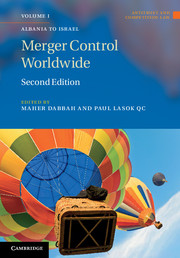Book contents
- Frontmatter
- Contents
- Preface
- List of Contributors
- Table of cases
- Table of Legislation and Official Guidance
- Introduction
- Albania
- Argentina
- Armenia (Republic of Armenia)
- Australia
- Austria
- Barbados
- Belgium
- Bosnia and Herzegovina
- Brazil
- Bulgaria (Republic of Bulgaria)
- Canada
- Chile
- China*
- Costa Rica
- Croatia
- Cyprus (Republic of Cyprus)
- Czech Republic
- Denmark
- Estonia
- European Economic Area
- European Union
- Finland
- France
- Germany (Federal Republic of Germany)
- Greece
- Hong Kong
- Hungary
- Iceland
- India
- Indonesia (Republic of Indonesia)
- Ireland
- Israel
- Italy
- Japan
- Kenya
- Korea
- Latvia
- Lithuania
- Macedonia (Republic of Macedonia)
- Malta
- Mexico
- Netherlands (The Netherlands)
- New Zealand
- Norway
- Pakistan
- Peru
- Philippines (Republic of the Philippines)
- Poland
- Portugal
- Romania
- Russia
- Serbia
- Singapore
- Slovakia (Slovak Republic)
- Slovenia
- South Africa
- Spain
- Sri Lanka
- Sweden
- Switzerland
- Taiwan
- Thailand
- Tunisia (Republic of Tunisia)
- Turkey
- Ukraine
- United Kingdom
- United States of America
- Uzbekistan
- Venezuela
- Zambia
- Index
Kenya
Published online by Cambridge University Press: 05 November 2014
- Frontmatter
- Contents
- Preface
- List of Contributors
- Table of cases
- Table of Legislation and Official Guidance
- Introduction
- Albania
- Argentina
- Armenia (Republic of Armenia)
- Australia
- Austria
- Barbados
- Belgium
- Bosnia and Herzegovina
- Brazil
- Bulgaria (Republic of Bulgaria)
- Canada
- Chile
- China*
- Costa Rica
- Croatia
- Cyprus (Republic of Cyprus)
- Czech Republic
- Denmark
- Estonia
- European Economic Area
- European Union
- Finland
- France
- Germany (Federal Republic of Germany)
- Greece
- Hong Kong
- Hungary
- Iceland
- India
- Indonesia (Republic of Indonesia)
- Ireland
- Israel
- Italy
- Japan
- Kenya
- Korea
- Latvia
- Lithuania
- Macedonia (Republic of Macedonia)
- Malta
- Mexico
- Netherlands (The Netherlands)
- New Zealand
- Norway
- Pakistan
- Peru
- Philippines (Republic of the Philippines)
- Poland
- Portugal
- Romania
- Russia
- Serbia
- Singapore
- Slovakia (Slovak Republic)
- Slovenia
- South Africa
- Spain
- Sri Lanka
- Sweden
- Switzerland
- Taiwan
- Thailand
- Tunisia (Republic of Tunisia)
- Turkey
- Ukraine
- United Kingdom
- United States of America
- Uzbekistan
- Venezuela
- Zambia
- Index
Summary
Despite concerted governmental efforts directed at improving Kenya’s economy, the country still faces significant hurdles to achieving consistent economic growth. Indeed a Report prepared by the Organisation for Economic Co-operation and Development (OECD) in 2003 stated that Kenya’s economic performance remains well below its potential. Clearly, this can be expected to affect the development of competition law and policy in the country and on the whole it has done so.
Relevant legislation and statutory standards
Mergers and acquisitions in Kenya are governed by Part III of the Restrictive Trade Practices, Monopolies and Price Control Act, Chapter 504, Laws of Kenya 1989 (hereinafter referred to as ‘the RTPMPCA1989’ or ‘the Act’). The Act is in place to encourage a healthy system of competition, by reducing participation in restrictive trade practices and controlling monopolies and concentrations of economic power. In general, any agreements or trade associations featuring the following are defined as restrictive trade practices which shall not be enforceable in legal proceedings:
Refusal and discrimination in connection with the sale or supply of goods.
Resale price maintenance.
Price discrimination.
- Type
- Chapter
- Information
- Merger Control Worldwide , pp. 863 - 872Publisher: Cambridge University PressPrint publication year: 2012



